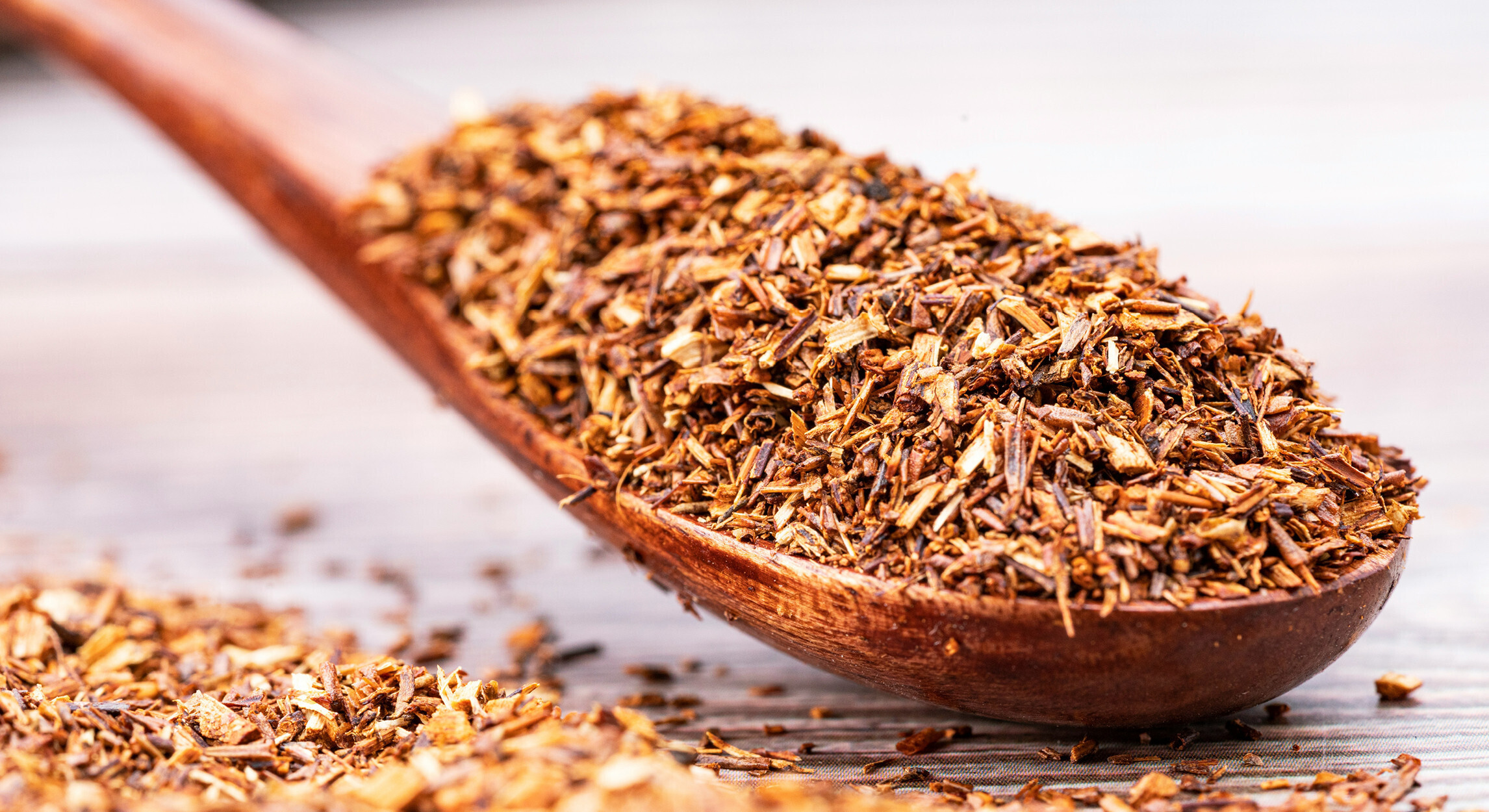Rooibos, also known as red tea, is a plant native to South Africa that has gained worldwide popularity in recent decades, not least for its health-giving properties. Traditionally used by indigenous peoples for centuries, Rooibos offers not only a unique flavour but also a host of benefits for our bodies. This article takes an in-depth look at the history, ingredients and benefits of this exceptional plant.
History & origins of Rooibos:
Rooibos (Aspalathus linearis) is a plant that grows in the Cederberg Mountains, north of Cape Town in South Africa. The Khoisan people, the first inhabitants of this region, were the first to discover and use Rooibos for its medicinal properties. They harvested the leaves and stems, fermented them, then dried them in the sun to use as an infusion. At the beginning of the 20th century, Dr Pieter Le Fras Nortier rediscovered Rooibos and began promoting its benefits as an alternative to black tea, which was very popular at the time but also very expensive, due to the First World War. Since then, Rooibos has grown exponentially in popularity, particularly in Europe and North America.
Components of Rooibos:
Rooibos is rich in a variety of bioactive compounds that give it its many benefits for the body. First of all, it contains antioxidants such as aspalathin, quercetin and luteolin, which help to protect cells against damage caused by free radicals. It also contains polyphenols, notably flavonoids, which are plant compounds with anti-inflammatory and antiviral effects. But that's not all! Rooibos contains a significant amount of essential minerals such as iron, calcium, potassium, copper, zinc, magnesium and manganese. These minerals play an important role in maintaining various bodily functions, including bone health, energy production and immune function. Finally, unlike black and green tea, Rooibos contains fewer tannins.
The benefits of Rooibos for the body:
- Anti-inflammatory & digestive properties: Rooibos contains anti-inflammatory compounds, such as the flavonoids mentioned above, which can help reduce certain inflammations in the body. By reducing inflammation, Rooibos can also help to improve digestive health. Its antispasmodic properties help relax the muscles of the intestine, which can be beneficial for people suffering from abdominal cramps, colic and diarrhoea. In addition, the polyphenols in Rooibos promote healthy digestion.
- Antioxidant properties & immune support: The antioxidants in Rooibos, particularly aspalathin and nothofagin, help to protect the body against oxidative stress. By neutralising free radicals, the antioxidants in Rooibos help to prevent certain diseases. Thanks to its high antioxidant and mineral content, Rooibos can help boost the immune system. The zinc and copper it contains are essential for the immune system to function properly.
- Skin care: The antioxidants and minerals present in Rooibos can also have beneficial effects on the skin. Rooibos is used in many skin care products for its soothing and anti-ageing properties. It can help reduce the signs of ageing, soothe skin irritations and treat conditions such as acne and eczema.
- Relaxing effects: Unlike black and green tea, Rooibos contains no caffeine. It can therefore be drunk at any time of day without risk of insomnia or nervousness.
Variations & uses:
Rooibos is extremely versatile and can be used in many different ways. Although traditionally used as an infusion, there are other ways of enjoying its benefits while varying the pleasures. For example, why not make yourself an iced Rooibos? Prepare a large quantity of Rooibos, leave it to cool and serve it over ice with a slice of lemon. Fancy a hot drink? Then opt for a Rooibos Latte: mix infused Rooibos with hot milk and a little honey for a comforting drink. More of a fruity note? Add infused Rooibos to your smoothies for a unique and healthy touch. Finally, in the kitchen, you can also use Rooibos as an ingredient in your pastry recipes or as a base for sauces and marinades.
Cautions & side effects:
Rooibos is generally considered safe for most people when consumed in moderation. However, it is important to take certain precautions. Although very rare, allergic reactions to Rooibos can occur. If you experience symptoms such as itching, skin rashes or breathing difficulties after consuming Rooibos, consult a doctor. What's more, because of its rich composition, Rooibos may interact with certain medicines, particularly cholesterol treatments and anti-hypertensive drugs. Consult your doctor if you are taking medication before consuming this plant regularly and in large quantities.
Conclusion:
At Ecosystem Laboratoire, we love Rooibos, and we selected it from the list of 4 ingredients used to make our Yapana+ herbal tea. In fact, our herbal tea contains just 4 ingredients: Yapana, Green Tea, Lapacho and finally Rooibos! If you'd like to discover our herbal tea, you can find it in our wellbeing range in individual formats and in our packs. Our Yapana+ herbal tea contains no colourings or preservatives!










